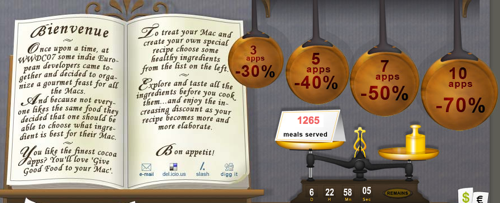Indie Upgrade Cycles
Tuesday, December 18th, 2007There are some very insightful comments on the last post, as expected from Daring Fireball readers. Thankfully, nobody took anything personally, because it was about whether super-cheap bundles are an efficient way of gaining customers, rather than any reflection on MacZOT (or any other bundle / discount) buyers or a particular site.
One theme running through the comments that did make me wonder ran along the lines of “the lack of updates caused me to look elsewhere”. There is the irony there that the extra support work not only delayed the 1.3 release, but put a squeeze on everything else I did.
The striking thing about this complaint though, is that it’s something I’ve also heard quite a lot in support emails regarding a number of Together’s competitors. I admit that I don’t keep tabs on them, because I don’t see the point, but as far as I can tell most of these apps get updated every 3 – 6 months, with bug fix / tweaks released every month or so, just like KIT.
For example, Soukyan writes:
What bothered me was that development seemed to slow to a halt for quite some time. I realize that you were preparing the 2.0 release, but this is the problem with small developers. My license entitles me to 1.x upgrades for free, but the paradigm in software has become, release, upgrades to release.5 at the most, and then do a new release and charge for the upgrade. Whatever the reasoning behind it, I don’t mind, but I do mind when the developer seems to drop off the face of the earth. The tells me that I cannot rely on the software to be maintained for the long term.
It’s when indie developers are quiet that they’re probably working the hardest. I spent almost the entire year working on KIT/Together. Version 1.3 was released within 6 months of the bundle and 2.0 another 9 months later, soon after Leopard was released. That was a longer gap than I’d normally like to have but in the meantime, KIT was updated every month or so all the way up until October, when it was made Leopard-compatible.
Obviously Leopard’s delay, and lack of development in the meantime, impacted everything quite significantly. I started Together when Leopard was supposed to be released in late June (and some rumour sites were adamant it would be April). I opened a lot of bugs about Leopard with Apple, a number of which still haven’t been closed and had to do a lot of work twice, to work around problems.
Indie Mac apps in general have frequent free updates that add features as well as fix bugs (often within days of them being reported), and this is what sets independent developers, whether individuals or small teams, apart from the likes of big companies such as Microsoft or Adobe, who release something huge every two years and nothing in between. Even Apple only manages, at best, annual updates to their applications, with the free, minor updates offering fixes but little in the way of new functionality (one exception being iTunes, but generally this is to support new iPods/iPhone or iTunes Store initiative).
Software development takes a long time and it’s most efficient to bundle changes together. One feature may appear as a bullet point, but take many weeks to design, develop and test. Most new features will impact something else, so the repercussions of even a handful of new features can be mind-boggling. Even a release that takes 2 or 3 months can easily devour another month in support, and for all sorts of reasons.
It’s a real balancing act for developers to come up with a release that has enough in it to satisfy people’s requests, works well, and provides enough features to get the attention of new buyers in a reasonable timeframe. I generally manage to release 2 to 3 such updates a year, alternating between both of my apps, and punctuated by the more regular bug fix releases.
Because indie Mac software is pretty low-priced anyway, and full version upgrades (e.g. 2.0, 3.0) often years apart, it’s important to keep that momentum going. There comes a point though where an upgrade like that won’t cut it and you need to make some pretty large changes, and that’s when it’s time for a major new version.
I guess that in Together’s market, where there is a range of diverse competitors people seem to bounce between, and where people may also use web apps that tend to trickle out smaller changes more frequently, people’s expectations can be very high.


